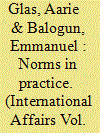| Srl | Item |
| 1 |
ID:
161722


|
|
|
|
|
| Summary/Abstract |
This article examines an apparent contradiction in the normative order and security culture of the African Union (AU). Many scholars and policy-makers alike have recognized a disjuncture between the norm of anti-imperialism, as expressed through the principle of ‘African solutions to African problems’, and the dependence of the AU on extraregional actors. This article shows that material constraints alone do not explain the AU's behaviour in this regard. Rather, I argue that what appears to be a contradiction in the normative order of the AU is actually a particular practice—a pragmatic and rather automatic cognitive and behavioural trait of AU officials and one that unfolds in the daily operation of the AU. It is a practice wherein AU officials uphold both the anti-imperialist norm and their pragmatic dependence as mutually congruent. This article explores this apparent contradiction, documenting its origins and illustrating its operation in practice. To do so, it provides an account of AU practices from within the AU itself, conceptualizing the AU as a community of practice, and draws on 21 interviews with member state officials from the AU and its wider African Peace and Security Architecture, as well as with European and North American diplomatic officials working alongside the AU in Addis Ababa.
|
|
|
|
|
|
|
|
|
|
|
|
|
|
|
|
| 2 |
ID:
172877


|
|
|
|
|
| Summary/Abstract |
The Association of Southeast Asian Nations (ASEAN) and the Economic Community of West African States (ECOWAS) both recently adopted and institutionalized the norm of people-centric governance. This is potentially transformative for both, signalling a reorientation away from their private and elite-led normative foundations. In practice, however, the norm is understood and enacted in different ways by officials at each organization and with radically different effects. In ASEAN, the norm is understood and enacted in a limited and defensive way. Its institutionalization has led only to selective engagement with civil society and has not altered established modes of regional governance. In ECOWAS, however, the norm is understood as a means to render the organization more inclusive of civil society groups and has transformed the regional project in important ways, shaping the logic and form of regional intervention and conflict prevention. To explore these experiences—convergence in adoption and institutionalization of a norm and variation in its practice and effect—we develop a practice theoretic framework and rely on 76 interviews with regional and state officials. We show that each organizational case is usefully conceptualized as a community of practice wherein external norms are understood and practiced in particular ways and with particular effect.
|
|
|
|
|
|
|
|
|
|
|
|
|
|
|
|
| 3 |
ID:
173316


|
|
|
|
|
| Summary/Abstract |
How should scholars recognize and respond to the complexities of positionality during the research process? Although there has been much theorizing on the intersectional and context-dependent nature of positionality, there remains a disjuncture between how positionality is understood theoretically and how it is applied. Ignoring the dynamism of positionality in practice has implications for the research process. This article theorizes one means of recognizing and responding to positionality in practice: a posture of “active reflexivity.” It outlines how we can become actively reflexive by adopting a disposition toward both ongoing reflection about our own social location and ongoing reflection on our assumptions regarding others’ perceptions. We then articulate four strategies for doing active reflexivity: recording assumptions around positionality; routinizing and systemizing reflexivity; bringing other actors into the process; and “showing our work” in the publication process.
|
|
|
|
|
|
|
|
|
|
|
|
|
|
|
|
| 4 |
ID:
160479


|
|
|
|
|
| Summary/Abstract |
Multilateral treaty-making is a venerable tool for navigating a sovereignty-constrained world. But that is not all; it is also a taken-for-granted practice of the international system, constitutive of both state actors and the international system itself. Constitutive practices are meaningful social actions that serve to circumscribe thought and action in the social world, delineating and in part generating both agents and the system in which they operate. Multilateral treaty-making is one such practice. While states make treaties, so too does treaty-making make states. Multilateral treaty-making can and does serve the instrumental interests of states, but exploring the constitutive nature of treaty-making is an inquiry into the foundations upon which those instrumental calculations are made—why have states turned to this practice in pursuit of their interests? In this article we provide a mixed-method approach to observing the constitutive dynamics described by practice theory that have thus far proven relatively elusive to capture empirically. In so doing our inquiry provides a fuller understanding of a foundation of competent statehood and of the international system in which states operate.
|
|
|
|
|
|
|
|
|
|
|
|
|
|
|
|